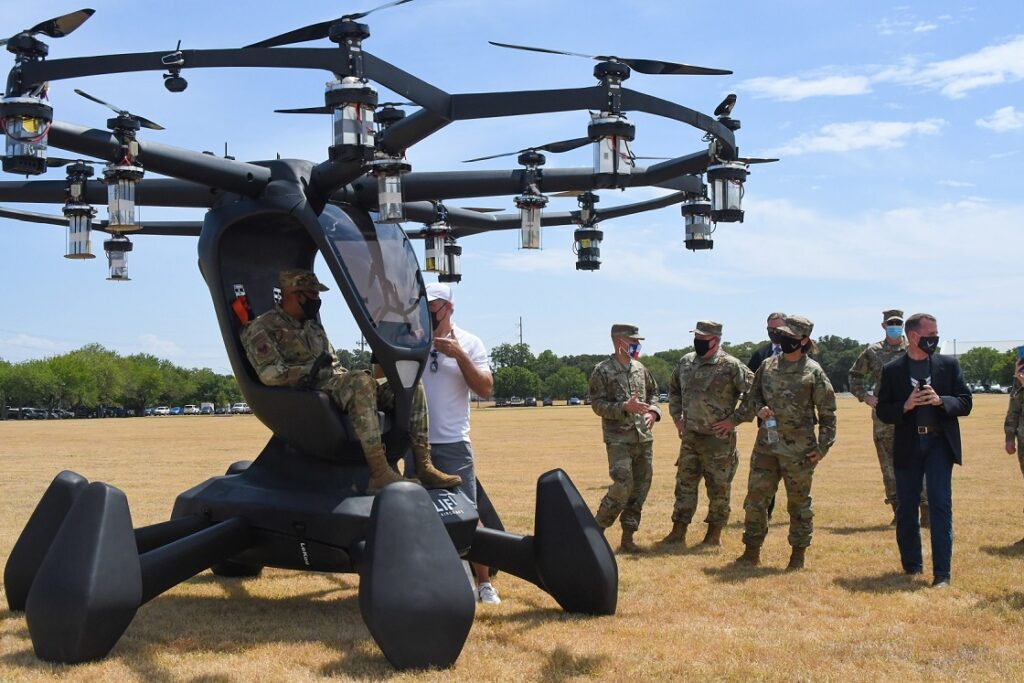
Leadership from the U.S. Air Force observed a manned demonstration of an electric vertical takeoff and landing (eVTOL) aircraft last week near Austin, Texas.
Secretary of the Air Force Barbara Barrett and Chief of Staff Charles Q. Brown, Jr. were on hand to witness LIFT Aircraft’s HEXA, a single-seat eVTOL aircraft powered by 18 overhead electric motors and propellers, fly for four minutes in a demonstration that included hovers, turns and forward flight within 40-feet of the ground.
The demonstration was part of a leadership visit to AFWERX, the Air Force’s innovation center and home to its Agility Prime initiative. LIFT Aircraft is one of 15 companies the service has contracted with under Agility Prime, encompassing three categories: One to two seats, three to eight seats, and unmanned cargo aircraft with greater than 1,320-pounds gross takeoff weight.
Development of the HEXA was announced publicly in December 2018. LIFT intends to certify the aircraft under the Federal Aviation Administration’s Part 103 as an ultralight and allow paying members of the public — after less than an hour of training and no pilot’s license — to fly it recreationally in scenic locations.
LIFT has conducted close to 600 test flights to date with a total of between 10-15 hours flight time across three pre-production aircraft and four pilots, according to Matt Chasen, founder and CEO of LIFT. Between one-third and half of those tests were with a pilot onboard.
“We are developing a touch screen interface – actually an iPad app running on a 12.9” iPad Pro,” Chasen told Defense Daily. “The touch screen app is not required for flight and so treated as a supplemental device. Other user interface elements are the joystick and also an audio/communications system that will eventually allow for some voice control features.”
Unlike most other eVTOL startups attempting to provide effective transportation services, Chasen is focused on recreational use. LIFT plans to offer flights over scenic, uncongested areas to start, such as the San Francisco Bay, Elliot Bay in Seattle, the Santa Monica waterfront, and Dubai’s Marina waterfront. Beginning early next year, LIFT plans to spend 12-18 months touring the United States, offering flights to more than 15,000 people on its waitlist and other members of the paying public.
“We believe the market for eVTOL will develop first with Ultralights under Part 103, then with public use including military, emergency medical, law enforcement and coast guard rescue, etcetera,” Chasen said. “Only after these aircraft get certified and are proven at the levels of safety required for passenger transportation — 10^9 — will they be used for transportation,” he added, referring to the one-in-a-billion failure rate necessary to certify an airframe with the FAA.
Chasen expects operating costs for each flight down will fall below $20 within five to 10 years, which would make each flight “1/10th to 1/50th the cost of traditional small helicopter flights.”
LIFT has received a total of $2.6 million in funding and grants through AFWERX, with much of that funding tied to future development milestones, according to Chasen. Five production HEXA aircraft are now under construction, two of which are to be allocated to Air Force flight test and evaluation activities “with the aim of evaluating our aircraft against the airworthiness certification requirements the DOD has for their aircraft,” he said.
In addition to understanding the technology and its performance, the Air Force is attempting to identify applications for the HEXA within the service.
“We now have over 15 of the leading aircraft manufacturers in the world applying to partner with Agility Prime, with many of them already on contract,” said Col. Nathan Diller, AFWERX director and Agility Prime lead. “This flight today marks the first of many demonstrations and near-term flight tests designed to reduce the technical risk and prepare for Agility Prime fielding in 2023.”